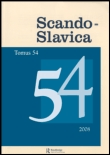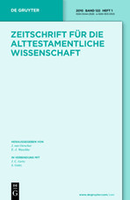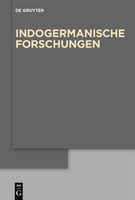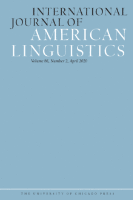
JOURNAL OF INDO-EUROPEAN STUDIES
metrics 2024
Advancing Interdisciplinary Insights in Indo-European Studies
Introduction
JOURNAL OF INDO-EUROPEAN STUDIES, published by the Institute for the Study of Man, is a prestigious academic journal dedicated to the interdisciplinary exploration of the Indo-European languages and cultures. With an ISSN of 0092-2323, this journal has gained notable recognition within the fields of Anthropology, Archaeology, History, Linguistics, and Literature, as evidenced by its commendable placement in the Category Quartiles for 2023. Specifically, it ranks in Q2 in History and Literature, and maintains a strong presence in Q3 across various other humanities disciplines. Though it ceased coverage in Scopus in 2021, it continues to serve as a vital resource for scholars seeking to delve into the complexities of Indo-European studies, presenting both theoretical and empirical research. The journal is particularly significant for researchers aiming to address contemporary questions while reflecting on historical contexts. With a focus on rigorous scholarship, it plays an essential role in fostering discourse among academics and students alike, and remains a crucial platform for contributions within its diverse scope.
Metrics 2024
 0.13
0.13 0.20
0.20 0.20
0.20 10
10Metrics History
Rank 2024
Scopus
JCI (Web Of Science)
Quartile History
Similar Journals

WELT DER SLAVEN-HALBJAHRESSCHRIFT FUR SLAVISTIK
Advancing Knowledge in Slavic StudiesWelt der Slaven-Halbjahresschrift fur Slavistik is a distinguished academic journal dedicated to the field of Slavic studies, published by Harrassowitz Verlag. With a focus on the rich tapestry of Slavic languages, literature, and cultural theory, this journal provides a vital platform for scholars, researchers, and students interested in the complexities of Slavic linguistics and literary expression. It operates on a semi-annual basis, encompassing converged years from 2002 to 2015 and continuing from 2017 to 2024, ensuring a continuous dialogue in an evolving academic landscape. Despite its Q4 and Q3 rankings in various categories—such as Linguistics and Language, Literature and Literary Theory, and Visual Arts and Performing Arts—its impact is noteworthy, with Scopus ranks that place it within the upper percentiles of arts and humanities fields. While currently not an open access publication, it remains an essential resource for those engaged in the interdisciplinary exploration of Slavic cultures and their global significance. The journal emphasizes innovative research and critical analysis, making it a key contribution to the ongoing discourse in Slavistics.

Scando-Slavica
Unveiling the Complexities of Cultural ExchangesScando-Slavica is a renowned academic journal published by ROUTLEDGE JOURNALS, TAYLOR & FRANCIS LTD, specializing in the rich interplay of Scandinavian and Slavic studies. With its ISSN 0080-6765 and E-ISSN 1600-082X, the journal has been a critical resource for scholars since its inception in 1954, covering a wide range of disciplines including archaeology, cultural studies, history, linguistics, and literature. As of 2023, it has consistently ranked in the third quartile across various categories, indicating its influential role in disseminating innovative research within the arts and humanities. With a focus on interdisciplinary dialogue, Scando-Slavica aims to foster a deeper understanding of cultural exchanges and linguistic connections, making it an essential read for researchers, professionals, and students interested in exploring the complexities of Nordic and Slavic interactions. While currently not an open access journal, its contributions have garnered substantial citations, bolstering its academic impact and relevance in a diverse scholarly landscape.

ZEITSCHRIFT FUR SLAVISCHE PHILOLOGIE
Pioneering Research in Slavonic LinguisticsZEITSCHRIFT FUR SLAVISCHE PHILOLOGIE is a pivotal journal in the field of Slavonic philology, published by Universitatsverlag C Winter Heidelberg GmbH. Renowned for its scholarly rigor and insightful contributions, this journal serves as a key platform for researchers, professionals, and students interested in Slavic languages and linguistics. Despite its classification as a traditional subscription journal, it has maintained a consistent presence in the academic community with contributions that enhance understanding of linguistic, cultural, and literary studies within the Slavic context. With an H-index reflecting its impact and relevance, the journal has historically been indexed in Scopus, ranking in the 34th and 33rd percentiles within the Arts and Humanities and Social Sciences categories, respectively. The journal has featured a range of scholarly articles from 2002 to 2017, providing a rich repository of knowledge for those dedicated to the study of Slavic languages. For any researcher aiming to delve into this dynamic field, ZEITSCHRIFT FUR SLAVISCHE PHILOLOGIE remains an essential resource.

REVUE DE LINGUISTIQUE ROMANE
Fostering Interdisciplinary Dialogue in LinguisticsREVUE DE LINGUISTIQUE ROMANE, published by the esteemed SOCIÉTÉ LINGUISTIQUE ROMANE, is a prominent academic journal dedicated to the exploration of Romance linguistics. With its ISSN 0035-1458, the journal plays a significant role in advancing knowledge within the fields of linguistics and the history and philosophy of science. Although it does not currently offer Open Access, it provides critical insights and peer-reviewed research that are indispensable for scholars, educators, and students interested in the nuances of Romance languages. The journal, which has seen converged coverage from 2006 to 2017, and then again from 2019 to 2021, is ranked in the third quartile (Q3) across various categories within Scopus, reflecting its established presence in the academic community. As a vital resource for interdisciplinary studies, REVUE DE LINGUISTIQUE ROMANE is instrumental for those seeking to deepen their understanding of linguistic structures, cultural nuances, and the historical development of Romance languages.

LATOMUS
Illuminating the Past, Shaping the FutureLATOMUS is a distinguished academic journal published by Peeters in Belgium, offering a rich platform for scholarly discourse in the fields of Classics, Archaeology, History, Literature, and Linguistics. With the ISSN 0023-8856 and E-ISSN 2294-4427, it has established itself as an essential resource for researchers and professionals seeking to contribute to and engage with critical debates within these disciplines. While not an Open Access journal, LATOMUS is recognized for its robust impact in the academic community, achieving Q2 and Q3 rankings across various categories, including Classics and Archaeology, according to the latest 2023 evaluations. The journal publishes articles that span a range of topics relevant to antiquity and its influences, making it a vital resource for those exploring historical narratives and linguistic developments. As a publication dedicated to advancing scholarly knowledge since its inception in 1971, LATOMUS continues to serve as a cornerstone of academic inquiry within the humanities, promoting intellectual engagement and disseminating high-quality research in its converged years from 1971 to 1974, 1980, and from 2002 to the present.

Acta Orientalia Academiae Scientiarum Hungaricae
Cultivating Insightful Dialogues in Humanities ResearchActa Orientalia Academiae Scientiarum Hungaricae, published by AKADEMIAI KIADO ZRT, stands as a prominent peer-reviewed journal in the fields of Cultural Studies, History, and Literature. Since its inception in 2007 and continuing through 2024, the journal has established itself as an essential resource for scholars and practitioners, achieving Q1 rankings across multiple categories in 2023, highlighting its impact and relevance. With a strong presence in Scopus rankings, particularly in Literature and Literary Theory (Rank #269/1106, 75th Percentile) and History (Rank #738/1760, 58th Percentile), Acta Orientalia serves as a pivotal platform for innovative research that explores the intersections of culture, history, and literary theory. Currently, the journal offers traditional access options, maximizing its reach to a diverse readership. By publishing cutting-edge research, the journal contributes significantly to the academic discourse, fostering a deeper understanding of the complexities inherent in the human experience.

ZEITSCHRIFT FUR DIE ALTTESTAMENTLICHE WISSENSCHAFT
Unveiling the Complexities of Old Testament StudiesZEITSCHRIFT FUR DIE ALTTESTAMENTLICHE WISSENSCHAFT, published by WALTER DE GRUYTER GMBH, stands as a premier platform in the fields of Religious Studies and History, with distinguished rankings of Q1 in Religious Studies and Q2 in History. Established in Germany and active since 1881, this journal has a storied legacy of advancing scholarly dialogue pertaining to the Old Testament and its historical context. With an ISSN of 0044-2526 and an E-ISSN of 1613-0103, it serves as a crucial resource for researchers, professionals, and students, fostering a robust understanding of ancient texts and their significance in contemporary society. Though it does not currently offer open access, its merit is reflected in its Scopus rankings, placing it in the 65th percentile for Religious Studies and the 63rd percentile for History. As this journal continues its publication journey through 2024, it remains dedicated to enriching the academic landscape by publishing original research, critical reviews, and comprehensive studies that illuminate the complexities and nuances of Old Testament scholarship.

INDOGERMANISCHE FORSCHUNGEN
Unraveling the Threads of Language EvolutionINDOGERMANISCHE FORSCHUNGEN is a prominent academic journal, published by WALTER DE GRUYTER GMBH, focused on the field of linguistics and language studies. With an impressive history that dates back to 1892, this journal has been a vital resource for researchers and professionals exploring the intricacies of Indo-European languages. Although it does not offer open access, its comprehensive and rigorous articles—published in both print (ISSN: 0019-7262) and electronic formats (E-ISSN: 1613-0405)—are instrumental for anyone delving into historical linguistics and comparative studies. The journal currently holds a Q3 ranking in Linguistics and Language, indicating its significance within the academic community, as evidenced by its Scopus rankings in both the Arts and Humanities and Social Sciences domains. Spanning decades of scholarship, INDOGERMANISCHE FORSCHUNGEN plays a pivotal role in advancing the study of language and is essential for scholars aiming to contribute to the dialogue in this ever-evolving discipline.

Vestnik Drevnei Istorii-Journal of Ancient History
Connecting Archaeology, Classics, and HistoryVestnik Drevnei Istorii - Journal of Ancient History, published by the esteemed Russian Academy of Sciences and the State Academy of Humanities (GAUGN), plays a pivotal role in the interdisciplinary field of ancient studies. Fostering scholarly discourse since 2016, this journal is positioned at the crossroads of archaeology, classics, history, and linguistics, as evidenced by its impressive 2023 ranking in multiple categories, including Q1 in Classics and Q2 in History. Although not open access, it serves as a critical resource for researchers, professionals, and students interested in deepening their understanding of ancient societies and cultures. With a reputation for rigor and a commitment to advancing knowledge, the journal aims to disseminate innovative research that sheds light on the complexities of ancient civilizations and their contributions to contemporary society. Current issues and a wealth of archived articles are available for exploration, fostering a rich environment for scholarly engagement.

INTERNATIONAL JOURNAL OF AMERICAN LINGUISTICS
Delving Deep into Linguistic Structures and Nuances.The INTERNATIONAL JOURNAL OF AMERICAN LINGUISTICS, published by University of Chicago Press, is a revered scholarly publication dedicated to the exploration and advancement of linguistic studies, particularly those related to the American linguistic landscape. With an ISSN of 0020-7071 and an E-ISSN of 1545-7001, this journal serves as a vital platform for researchers, professionals, and students interested in the nuances of language, dialects, and linguistic structures through rigorous academic inquiry. The journal has established a commendable impact, reflected in its ranking within the Q2 category in Linguistics and Language and its placements in the Scopus rankings, thereby positioning itself within the 50th to 53rd percentile of its respective fields. While the journal does not provide Open Access options, it continues to be a cornerstone resource for those seeking to expand their understanding of American linguistics, already converging from 1996 to 2024. Through its continued commitment to excellence, this publication remains essential for those aiming to contribute significantly to the field.